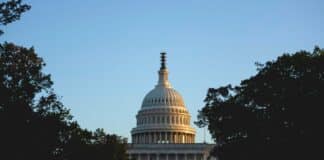New email evidence has emerged suggesting that Dr. Anthony Fauci, the director of the National Institute of Allergy and Infectious Diseases (NIAID), “prompted” the drafting of a scientific paper intended to “disprove” the lab leak theory about the origins of COVID-19.
The Republican leadership on the House Select Subcommittee on the Coronavirus Pandemic released a memo on Sunday revealing this new information.
The memo states that “the authors of this paper skewed available evidence to achieve that goal [of disproving the lab leak theory], and Dr. Jeremy Farrar went uncredited despite significant involvement.”
It also alleges that Fauci and Dr. Francis Collins, the director of the National Institutes of Health, were warned in a conference call on February 1, 2020, that COVID-19 may have leaked from a lab in Wuhan, China, and may have been intentionally genetically manipulated.
Just three days later, four participants of the conference call wrote a paper entitled “The Proximal Origin of SARS-CoV-2” and sent a draft to Fauci and Collins.
The paper was later sent to Fauci for editing and approval before being published in Nature Medicine.
However, an email from Collins to Fauci on April 16, 2020, expresses disappointment that the paper did not “squash the lab leak hypothesis” and asks if the NIH can do more to “put down” the theory.
“The next day—after Dr. Collins explicitly asked for more public pressure—Dr. Fauci cited Proximal Origin from the White House podium when asked if COVID-19 leaked from a lab,” the memo says.
The memo cites several emails indicating that Fauci “prompted” Dr. Kristian Andersen, a professor at Scripps Research, to write the paper and that the goal was to “disprove” the lab leak theory.
However, in a response to a letter from then-Committee on Oversight and Reform Ranking Member James Comer and then-Committee on the Judiciary Ranking Member Jim Jordan, Scripps asserts that Andersen “objectively” investigated the origins and that Fauci did not attempt to influence his work.
The memo disputes these assertions.
The memo also notes that while Proximal Origin was going through peer review with Nature Medicine, Andersen “actually did not find the pangolin data compelling,” but later claimed that he and other researchers “looked at data from coronaviruses found in other species, such as bats and pangolins, which demonstrated that the features that first appeared unique to SARS-CoV-2 were in fact found in other, related viruses.”
“Privately, Dr. Andersen did not believe the pangolin data disproved a lab leak theory despite saying so publicly. It is still unclear what intervening event changed the minds of the authors of Proximal Origin in such a short period of time. Based on this new evidence, the pangolin data was not the compelling factor; to this day, the only known intervening event was the February 1 conference call with Dr. Fauci.”
One of the authors, Ian Lipkin, also expressed concerns in an email during the paper’s drafting process that “It does not eliminate the possibility of inadvertent release following adaptation through selection in culture at the institute in Wuhan. Given the scale of the bat CoV research pursued there and the site of emergence of the first human cases we have a nightmare of circumstantial evidence to assess.”
In a February 17, 2020 email, Lipkin thanked Farrar for “shepherding” the paper, noting “Rumors of bioweaponeering are now circulating in China.”
Farrar agreed to push Nature to publish it.
The new evidence presented by the memo is likely to intensify the scrutiny on Fauci and fuel further debate about the possibility of a lab leak as the origin of COVID-19.






